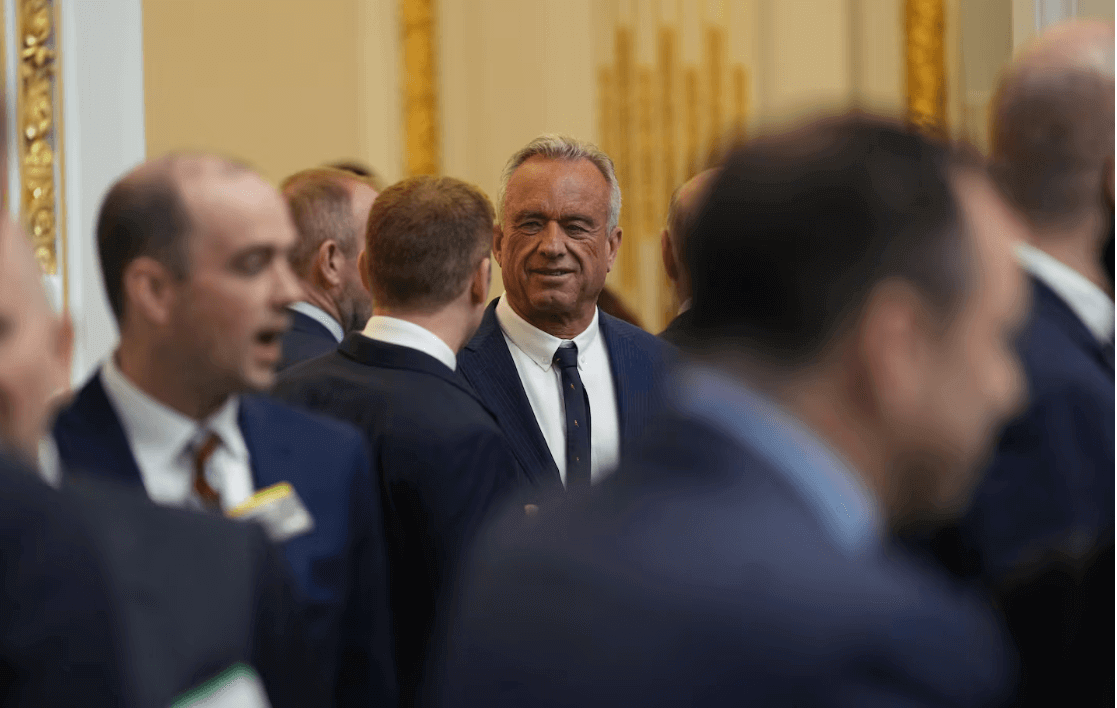有时罗伯特·肯尼迪可能听起来像个自由主义者,但进步派参议员对此深表怀疑

【中美创新时报2024 年 12 月 15 日编译讯】(记者温友平编译)罗伯特·肯尼迪 (Robert F. Kennedy Jr.) 强烈反对疫苗,坚定支持唐纳德·特朗普 (Donald Trump),并在许多问题上倾向于阴谋论,人们很容易忘记他与民主党参议员的共同点,而特朗普挑选的其他内阁成员都没有这种共同点。《波士顿环球报》记者Sam Brodey 和 Jim Puzzanghera对此作了下述报道。
本周,肯尼迪开始在国会山巡回,争取获得卫生与公众服务部部长的提名。他长期以来一直倡导自由主义,从反对食品和化石燃料行业的企业集团到谴责气候变化和收入不平等。
但他不应该期待进步人士的热烈欢迎,即使他有时听起来和他们中的许多人一模一样。
对一些人来说,肯尼迪的共同信仰只是为他们提供了一扇门。其他人已经彻底关上了那扇门。
佛蒙特州民主党参议员彼得·韦尔奇表示,肯尼迪“拒绝科学”,但他看到肯尼迪在一些领域与他的观点一致——“食品添加剂、健康饮食、锻炼。他承认我们在处方药价格上被欺骗了。”

但当被问及他是否会考虑支持肯尼迪时,韦尔奇说:“我会听的。我的意思是,我真的很喜欢他对清洁食品和禁止添加剂的关注。”
同样,肯尼迪对企业的怀疑论有时听起来与参议员伊丽莎白·沃伦自己的言论相差无几,但这不足以压倒她的其他担忧。
“这一切都很重要,但我们不能因为儿童没有接种麻疹疫苗而牺牲他们的生命,因为卫生和公共服务部负责人陷入了某种反科学的阴谋论,”沃伦说。
肯尼迪的反疫苗观点是民主党人在被问及他的提名时通常首先提到的担忧,但这远非他们心中唯一的担忧。
参议员埃德·马基上个月迅速明确表示他不会投票确认肯尼迪,他列举了他过去的一些立场——从质疑艾滋病毒是否导致艾滋病到抗抑郁药是否导致大规模枪击事件——以辩称他“已经失去任职资格”。
“罗伯特·肯尼迪在一个公共卫生问题上可能是正确的,但这并不意味着他在许多公共卫生问题上都是错误的,”马基说,他是参议院卫生、教育、劳工和养老金委员会医疗保健小组的民主党高层。
如果肯尼迪赢得除三名共和党参议员之外的所有共和党参议员的支持,他将不需要民主党的选票来确认。肯尼迪与民主党重叠的另一面是,共和党的一致支持并不能保证。
例如,一些共和党人对这位前民主党人过去对堕胎权的支持感到不安,而卫生与公众服务部在这一领域具有重大影响力。与此同时,他对食品和农业行业的抨击引发了主要农业州的共和党参议员的真正担忧。
值得注意的是,两位有影响力的共和党人可能会对肯尼迪的反疫苗观点进行强烈反击。路易斯安那州共和党参议员比尔·卡西迪担任参议院卫生小组主席;他是一名医生,一直倡导疫苗的安全性和有效性,包括 COVID。而刚刚卸任参议院共和党领袖的肯塔基州共和党参议员米奇·麦康奈尔 (Mitch McConnell) 是一名脊髓灰质炎幸存者。
周五,《纽约时报》报道称,肯尼迪的一名高级顾问已向美国食品和药物管理局请愿,要求撤销对脊髓灰质炎疫苗的批准。几个小时后,麦康奈尔向 Politico 发表声明,谴责这一举动。麦康奈尔说:“任何寻求参议院同意在新政府任职的人最好避免与此类努力有任何关联。”
不过,对肯尼迪最强烈的反击将来自民主党。由于他在党内最著名的政治家族中的声望,以及他一生在某些话题上的积极行动,肯尼迪将在国会山看到熟悉的面孔提出尖锐的问题:许多参议员都认识他。例如,马基说他与肯尼迪在气候问题上合作了“几十年”。
康涅狄格州民主党参议员理查德·布卢门撒尔在 20 世纪 90 年代与肯尼迪密切合作,当时布卢门撒尔担任康涅狄格州总检察长,肯尼迪则积极参与其法律倡导团体,该团体提起诉讼,以消除长岛海峡和哈德逊河的水污染。
“我非常尊重他在环境方面的工作,这是我们共同努力的目标,”布卢门撒尔说。“但我猜,我可能 15 年没和他说话了。”
相关:脊髓灰质炎疫苗对公共卫生意味着什么
不过,布卢门撒尔并不倾向于支持肯尼迪。“如果他继续采取报道的针对疫苗、麻疹、腮腺炎、风疹的立场,我将很难支持他,”他说。“反对儿童接种这些疫苗,我认为美国卫生与公众服务部部长的做法是错误的。”
对于那些愿意考虑肯尼迪的民主党人来说,原因是他对食品工业公司的严厉批评。他认为,华盛顿允许他们通过推广不健康和令人上瘾的产品,在最低限度的检查或监督下煽动慢性疾病流行。他表示支持禁止或限制已对健康影响进行审查的食用色素,以及高果糖玉米糖浆,这是软饮料和垃圾食品中普遍存在的廉价糖。
几十年来,民主党人一直发出同样的信号,而共和党人经常做出嘲讽性的回应,将他们的担忧视为自由派保姆国家的白日梦。
新泽西州民主党参议员科里·布克 (Cory Booker) 一直是食品行业最直言不讳的自由派批评者之一。上个月,肯尼迪分享了布克发布到 X 的一段视频,参议员在视频中批评了“让我们生病”的食品,并称赞布克在这一问题上“长期发挥领导作用”。
当被问及肯尼迪时,布克说:“我的意思是,当他谈论食品政策的很多方面时,听听他怎么说,食品中的化学物质,对超加工、含糖食品的补贴。”
“在这些领域,你会发现他的很多演讲似乎都是从我的演讲中抄袭而来的,”布克说。但他补充说,他“对疫苗接种和这份工作的其他公共卫生方面有很多担忧。”
佛蒙特州独立参议员伯尼·桑德斯明年将成为参议院卫生委员会的首席少数党成员。桑德斯长期以来一直是食品行业集团的批评者;在 12 月初委员会就食品行业在肥胖流行病中的作用举行的听证会上,桑德斯对 FDA 的谴责与肯尼迪的观点非常吻合。
上周四,桑德斯表示,他预计将很快与肯尼迪会面讨论提名问题,但拒绝回答进一步的问题。
即使是与肯尼迪在食品和营养问题上的观点一致的民主党人也认为,鉴于他所担任的职位,肯尼迪对这一问题的影响将是有限的。在这些食品问题上拥有最广泛管辖权的机构是农业部,该部负责管理食品援助计划并制定学校午餐标准等。
卫生与公众服务部下属的 FDA 负责监管哪些食品和补充剂是安全的,并影响营养指南。毫无疑问,这些与肯尼迪的观点有关,但卫生与公众服务部还负责监督美国国立卫生研究院和疾病控制中心,民主党人认为他的阴谋论观点和疫苗疑虑在这些领域产生了灾难性的影响。
“听着,在健康食品和努力确保我们的孩子有更有营养的饮食方面,我同意他的一些观点,”来自马里兰州的民主党参议员克里斯·范霍伦 (Chris Van Hollen) 说。马里兰州是国立卫生研究院和 FDA 的所在地。“我们有一些共识。但你知道,他是卫生与公众服务部的负责人……他在疫苗问题上的立场非常令人担忧,因为我确实认为这会危及国家的健康。”
题图:罗伯特·肯尼迪 (Robert F. Kennedy Jr.) 在纽约证券交易所,当选总统唐纳德·特朗普 (Donald Trump) 周四在这里敲响了当天的交易。道格·米尔斯 (DOUG MILLS)/纽约时报
附原英文报道:
RFK Jr. may sound like a liberal at times, but progressive senators are deeply skeptical
By Sam Brodey and Jim Puzzanghera Globe Staff,Updated December 15, 2024
Robert F. Kennedy Jr. at the New York Stock Exchange, where President-elect Donald Trump rang in the day’s trading on Thursday.DOUG MILLS/NYT
WASHINGTON — Between Robert F. Kennedy Jr.’s hard-line opposition to vaccines, staunch support of Donald Trump, and conspiratorial leanings on a number of subjects, it’s easy to forget the commonalities he shares with Democratic senators in a way that no other Trump pick for Cabinet does.
As Kennedy begins his rounds on Capitol Hill this week to push his nomination as health and human services secretary, he brings with him a long record of liberal advocacy — from crusading against corporate conglomerates in the food and fossil fuel industries to decrying climate change and income inequality.
But he shouldn’t expect a warm welcome from progressives, even if he sometimes sounds identical to many of them.
For some, Kennedy’s shared beliefs merely offer a foot in the door. Others have already slammed that door altogether.
Senator Peter Welch, a Vermont Democrat, said Kennedy has “rejected science” but he sees alignment with Kennedy in a few areas —”food additives, healthy eating, exercise. His acknowledgement we’re getting ripped off in prescription drug prices.”
But asked if he’d consider supporting Kennedy, Welch said, “I’m gonna listen. I mean, I really do like his focus on clean food and getting additives out.”
Likewise, Kennedy’s corporate-skeptical rhetoric can sound not too distant from Senator Elizabeth Warren’s own sometimes, but it’s not enough to override her other concerns.
“It’s all important, but we can’t sacrifice the lives of children because they don’t get their measles vaccine, because the head of HHS is caught in some conspiracy theory that is antiscience,” Warren said.
Kennedy’s antivaccine outlook is the first concern Democrats typically bring up when asked about his nomination, but it’s far from the only one on their minds.
Senator Ed Markey, who quickly made clear last month that he would not vote to confirm Kennedy, listed a number of his past positions — from questioning whether HIV causes AIDS or whether antidepressants cause mass shootings — to argue he has “disqualified himself” to serve.
“The fact that Robert Kennedy may be correct on one public health issue does not excuse his being wrong on many public health issues,” said Markey, who serves as top Democrat on the Senate Health, Education, Labor, and Pensions Committee’s subpanel on health care.
Kennedy will not need Democratic votes to be confirmed if he wins the support of all but three Republican senators. The flip side of Kennedy’s overlap with Democrats is that unanimous GOP support is not guaranteed.
Some Republicans, for instance, are uneasy about the former Democrat’s past support of abortion access, a realm where the Department of Health and Human Services has significant influence. His diatribes against the food and agriculture industry, meanwhile, have sparked real concern among Republican senators from major farming states.
Notably, a pair of influential Republicans could provide stiff pushback to Kennedy’s antivaccine views. Senator Bill Cassidy, a Louisiana Republican, chairs the Senate’s health panel; he is a physician who has advocated for the safety and efficacy of vaccines, including COVID. And Senator Mitch McConnell, the Kentucky Republican who just stepped down as Senate GOP leader, is a survivor of polio.
On Friday, The New York Times reported that a top Kennedy adviser had petitioned the Food and Drug Administration to revoke approval for the polio vaccine. Hours later, McConnell to Politico issued a statement castigating the move. “Anyone seeking the Senate’s consent to serve in the incoming administration would do well to steer clear of even the appearance of association with such efforts,” McConnell said.
Still, the most vociferous pushback to Kennedy will come from Democrats. Thanks to his prominence within the party’s most famous political family, and his lifelong activism on certain topics, Kennedy will see familiar faces asking tough questions on Capitol Hill: many senators know him personally. Markey, for instance, said he worked “for decades” with Kennedy on climate issues.
Senator Richard Blumenthal, a Connecticut Democrat, worked closely with Kennedy in the 1990s when he was attorney general of Connecticut and Kennedy was active in his legal advocacy group that filed lawsuits to eliminate water pollution in Long Island Sound and the Hudson River.
“I had enormous respect for his work on the environment, that’s what we worked on together,” Blumenthal said. “But I haven’t talked to him for maybe 15 years, I’m guessing.”
Related: What the polio vaccine has meant for public health
Still, Blumenthal isn’t inclined to back Kennedy. “I would have trouble supporting him if he continues to take the kind of stands that have been reported on vaccines, measles, mumps, rubella,” he said. “To oppose children having those vaccines, I think strikes me as wrong for the secretary of health and human services of the United States of America.”
For Democrats who are open at all to considering Kennedy, the reason is his tough criticism of food industry companies. He has argued that Washington has allowed them to foment a chronic disease epidemic by pushing unhealthy and addictive products with minimal checks or oversight. He has expressed support for banning or limiting food dyes that have been scrutinized for health impacts, as well as high fructose corn syrup, the cheap form of sugar prevalent in soft drinks and junk food.
For decades, Democrats have sounded the same notes, and Republicans often responded derisively, dismissing their concerns as liberal nanny-state pipe dreams.
Senator Cory Booker, a New Jersey Democrat, has been among the most vocal liberal critics of the food industry. Last month, Kennedy shared a video Booker posted to X in which the senator criticized food that is “making us sick” and praised Booker’s “long history of leadership” on the issue.
Asked about Kennedy, Booker said, “I mean, listen to him when he talks about a lot of aspects of food policy, the chemicals on food, the subsidizing of ultra-processed, sugar-filled foods.”
“Those are all areas where you find a lot of his speeches seem like he’s lifting from my speeches,” Booker said. But he added he “had a lot of concerns on the vaccination and other public health aspects of that job.”
Senator Bernie Sanders, a Vermont Independent, will be the top minority party member next year on the Senate health committee. Sanders has been a longtime critic of food industry conglomerates; at an early December hearing the committee held on the food industry’s role in the obesity epidemic, Sanders’ castigation of the FDA aligned closely with Kennedy’s views.
Last Thursday, Sanders said he expects to meet with Kennedy soon to discuss the nomination but declined to answer further questions.
There’s a sense even among Democrats aligned with Kennedy’s views on food and nutrition that the impact he could have on the issue would be limited, given the position he would hold. The agency with the broadest jurisdiction on those food matters is the Department of Agriculture, which administers food assistance programs and sets school lunch standards, among other things.
The Department of Health and Human Services houses the FDA, which regulates what foods and supplements are safe and influences nutrition guidelines. Those are relevant, no doubt, to Kennedy’s views, but HHS also oversees the National Institutes of Health and the Centers for Disease Control, areas where Democrats see his conspiratorial views and vaccine doubts having disastrous effect.
“Look, I share some of his views when it comes to healthy foods and trying to make sure that we have more nutritious diets for our kids,” said Senator Chris Van Hollen, Democrat from Maryland, which is home to the NIH and FDA. “There are areas of agreement. But, you know, this is the person that would be in charge of the Department of Health and Human Services . . . his position on vaccines is very concerning, because I do think it would put the country’s health at risk.”

